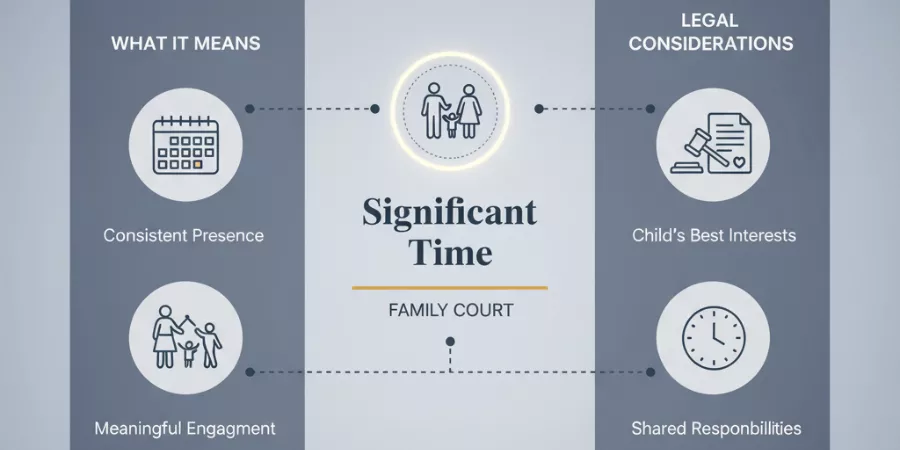When parents separate, questions about child custody arrangements become paramount in Family Law proceedings. One concept that frequently arises is ‘significant time’ – but what exactly does this mean in the Australian legal context? Whether you’re a parent navigating the family law system or a professional supporting families through separation, understanding this concept is key to achieving fair parenting arrangements. If you’re facing uncertainty about parenting matters, you may need to contact Pearsons for family law advice in Torquay to get personalised guidance on your specific situation.
Key Takeaways
- ‘Significant time’ is assessed based on quality, frequency and the nature of parent-child interactions rather than just counting hours.
- The child’s best interests remain the primary consideration when courts determine appropriate time arrangements.
- Courts consider various factors including the child’s age, development stage, and practical logistics when determining what constitutes significant time.
- Consistent documentation and evidence of involvement in a child’s life strengthen a parent’s position regarding significant time claims.
- Mediation and dispute resolution are important steps before court proceedings about parenting arrangements.
Legal Framework and Core Principles
Family Law Act and the Child’s Best Interests
The Family Law Act 1975 (Cth) establishes that the child’s best interests are the paramount consideration in all parenting matters. This foundational principle guides how courts approach the concept of ‘significant time’. Parenting orders are specifically framed around what arrangement will best serve the child’s developmental, emotional and physical needs – not what might seem fair to the parents.
How Courts Use Language: ‘Significant Time’ and Related Terms
The term ‘significant time’ appears in Section 65DAA of the Family Law Act, but there’s an important distinction between its informal usage and its application in judicial decisions. Courts may also refer to ‘substantial and significant time’, which generally means time that allows a parent to be involved in the child’s daily routine and significant events, as well as the child being involved in the parent’s life and daily activities.
Which Courts Handle Parenting Disputes
In Australia, the Federal Circuit and Family Court primarily handles parenting disputes. Since September 2021, these courts merged into a single entity with two divisions, creating streamlined pathways for family law matters. Most parenting disputes begin in Division 2 (formerly the Federal Circuit Court) and may progress to Division 1 (formerly the Family Court) for more complex matters.
How Courts Decide Whether Time is ‘Significant’
Key Factual Factors Judges Consider
Courts don’t rely on a specific formula or percentage split when determining ‘significant time’. Instead, they examine several practical elements including:
- Frequency and pattern of care (weekdays, weekends, holidays)
- Number of overnight stays
- The longevity of existing care arrangements
- The parent’s role during their time with the child (active caregiving vs passive supervision)
- Involvement in significant decisions about the child’s welfare
Child-Centred Factors
A child’s specific circumstances heavily influence what constitutes ‘significant time’. For younger children, frequent shorter visits may be more appropriate than extended periods away from their primary attachment figure. For school-aged children, educational consistency becomes important. Teenagers may have different needs again, with social relationships and activities playing a larger role in appropriate time arrangements.
Practical and Logistical Factors
Courts are pragmatic when assessing time arrangements. They consider distance between parents’ homes, travel requirements, parental work schedules, and housing stability. A time arrangement that looks good on paper but causes excessive disruption to a child’s routine may not be considered in their best interests, regardless of how the hours add up.
Evidence the Court Finds Persuasive
Written Records and Objective Documents
Concrete evidence carries significant weight in family proceedings. Courts value objective records such as:
- Care calendars showing consistent time spent with the child
- School records showing parental involvement in education
- Medical records indicating attendance at appointments
- Communication logs between parents about child-related matters
- Photos or videos demonstrating ongoing parent-child relationships (though these should be used judiciously)
Witness Evidence and Statements
Third-party perspectives can strengthen a parent’s case regarding significant time. Teachers, healthcare providers, and family members who can speak to the quality of the parent-child relationship and the parent’s consistent involvement provide valuable context for the court.
“Quality of time with a child is just as important as quantity when courts assess parenting arrangements. We often tell clients to focus on meaningful engagement during their time with children rather than simply counting hours or days.” – Pearsons Lawyers
Demonstrating Quality of Time, Not Just Quantity
Courts look beyond the clock to assess whether time is truly ‘significant’. Evidence that a parent actively participates in homework, extracurricular activities, and routine care (like preparing meals, bedtime routines, and healthcare) demonstrates meaningful involvement that supports a finding of significant time.
Typical Arrangements That May Amount to ‘Significant Time’
Regular Overnight Care
Weekend stays (typically Friday afternoon to Sunday evening or Monday morning) combined with some mid-week contact often satisfies the threshold for significant time, particularly for school-aged children.
Shared-Week Arrangements
Alternating weeks, 5-2-2-5 schedules, or similar patterns that provide substantial blocks of time with each parent typically constitute significant time. These arrangements work best when parents live relatively close to each other and can maintain consistency in the child’s schooling and activities.
Frequent Mid-Week Care Combined with Weekend Time
For parents who can’t accommodate full weekend blocks, a pattern of regular after-school care several days per week combined with occasional overnight stays may amount to significant time, particularly if it involves meaningful participation in the child’s routine.
Extended Holiday Time
For parents who live far apart, extended stays during school holidays, combined with regular communication when separated, may constitute significant time within the practical constraints of the situation.
Practical Steps for Parents
Record-Keeping Best Practice
Maintaining detailed records of time spent with your child and your involvement in their life is crucial. Use digital calendars, co-parenting apps, or written logs to track visits, appointments, and communications about your child. Store these records securely and bring them to any legal consultations.
Proposing Realistic Parenting Plans
When developing proposed arrangements, focus on schedules that reflect your child’s actual routine, not idealised scenarios. Consider school locations, extracurricular activities, and the child’s developmental stage when suggesting time splits.
Using Mediation Before Court
In Australia, attempting Family Dispute Resolution is typically mandatory before filing court applications about children (with exceptions for urgent or safety matters). Mediation often produces more workable arrangements than court-imposed solutions and can establish a foundation for collaborative co-parenting.
Safety and Special Circumstances
How Family Violence Affects Assessment
When safety concerns exist, the court prioritises protection over the concept of significant time. Risk assessments determine whether supervised contact, gradual reintroduction of time, or other protective measures are needed before significant time can be safely implemented.
Disability and Complex Health Needs
For children with special needs, courts may require specific expertise or facilities to be available during parenting time. Arrangements might need to accommodate therapy schedules, medication routines, or accessibility requirements.
The path to establishing significant time with your child requires careful planning, documentation, and often legal guidance. Understanding how courts interpret this concept helps parents set realistic expectations and develop proposals that truly serve their children’s best interests. Whether you’re just beginning to develop a parenting plan or seeking to modify existing arrangements, focusing on quality engagement with your child strengthens your position.
When facing complex parenting matters, seeking professional legal advice tailored to your specific circumstances is often the most direct path to resolution. Pearsons Lawyers can provide the expertise and guidance necessary to navigate parenting arrangements that meet the legal threshold for significant time while supporting your child’s wellbeing.












